When I spoke with Tribeca Film Festival Artistic Director Frédéric Boyer from Paris on the line-up for the 20th anniversary edition, he highly recommended Last Film Show (Chhello Show). Pan Nalin bookends his very personal film with the gratitude he feels to cinema history by naming the Lumière brothers, Eadweard Muybridge, David Lean, Stanley Kubrick and Andrei Tarkovsky before the opening credits and ends with a highly imaginative tribute to the colour palates of filmmakers such as Satyajit Ray, Michelangelo Antonioni, Maya Deren, Jean-Luc Godard, Alfred Hitchcock, Yasujiro Ozu, and Martin Scorsese to name just a few.
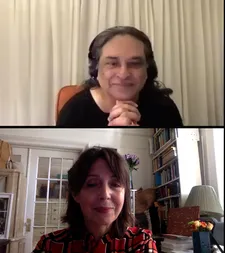 |
| Pan Nalin with Anne-Katrin Titze on Stanley Kubrick: “The Shining will have something else than 2001: A Space Odyssey, the creative approach will be very different.” |
Last Film Show, shot by Swapnil S Sonawane, starring Bhavin Rabari (as Samay) with Bhavesh Shrimali (as Fazal, Projectionist at the Galaxy Cinema), Richa Meena (as Baa, Samay’s mother), Dipen Raval (as Bapuji, Samay’s father), Vidita Mehta (as Sili, Samay's sister), Paresh Mehta (Galaxy Cinema Manager), Vikas Bata (as Nano), Rahul Koli (as Manu), Shoban Makwa (as Badshah), Kishan Parmar (as ST), Vijay Mer (as Tiku), Alpesh Tank (as Teacher Mr. Dave), and Tia Sebastien (as Leela Mila), is a highlight of the 2021 Tribeca Film Festival.
9-year-old Samay, who has a vivid imagination, lives in the small village of Chalala in the region of India named Gir, where lions roam freely and the vast majority of the population is vegetarian. The boy’s father sells tea at the train station and his mother is the best cook in the world (judging by what we see on screen this is an entirely true statement). Samay is a born storyteller, and he and his friends are nothing but curious about exploring the flotsam that blows in with the railway and an abandoned building in what they call the ghost village. When Samay (whose name means time) discovers movies, nothing will ever be the same. He makes a deal with Fazal, the projectionist at the Galaxy Cinema, to swap his magnificent lunch for the opportunity to watch the films from the projection booth. He loves them all and the path is clear. He has to leave Chalala, learn English, and become a filmmaker.
From Mexico City, Pan Nalin joined me on Zoom for an in-depth conversation on Last Film Show.
Anne-Katrin Titze: Hello!
Pan Nalin: Hello, nice to meet you! Wow.
AKT: Where are you?
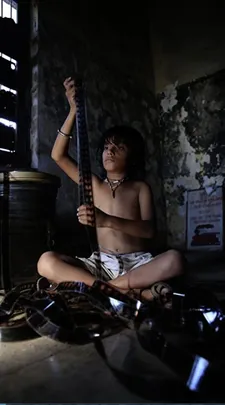 |
| Pan Nalin on Samay (Bhavin Rabari): “Sound and light and the idea of travel and time, it was so cinematic.” |
PN: I’m in Mexico City and I’m scheduled to travel to New York on the 8th of June, three days from now.
AKT: What are you doing in Mexico? A film project?
PN: Yes, my producers and writers are here so I decided to come. Also I was completing the Last Film Show in France, so I couldn’t come directly because the borders are closed between France and the US for EU citizens. It worked out really well as we had to do some development and writing here. So I spent three weeks, which qualifies me to hopefully enter and arrive. It’s considered 14 days of quarantine outside the US. I have to do my PCR test tomorrow and hopefully Tuesday I can take a flight. A complicated world now.
AKT: It is. You have an unusual beginning for Last Film Show - you start with gratitude!
PN: Ha!
AKT: For those illuminating the path, you chose the Lumières, Muybridge, David Lean, Kubrick and Tarkovsky. What made you decide to have them right there at the start before the “Pan Nalin Flight” begins?
PN: I couldn’t list all the filmmakers but as I was trying to do a kind of autobiographical tale of what I lived as a kid, some of these filmmakers came as a highlight for a couple of reasons. Somehow I knew them before I knew them. So in case of the Lumière brothers, one of the most important images was the train arriving at the station, which changed the world and how we tell stories. We as kids used to lie close to the track and there’s that wide angle shot of trains coming.
This was before I saw movies, before I had ever seen a movie. That used to look so impressive, something coming towards you. So later on at the age of nine when I discovered cinema and much later when I discovered the Hollywood besides and beyond Bollywood, and much later on world cinema, all these things kept coming back to me. And I realized that this film could not work till I pay tribute to these guys because they influenced me so much. Their work inspired me enormously. Everything - the way of storytelling, sound design, cinematography. Every time I watch movies of David Lean or Kubrick or Tarkovsky, I always find something new. I think two years ago there was an exhibition of Kubrick and I went to London. It’s just unbelievable.
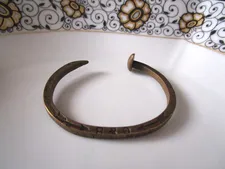 |
| Giles & Brother Philip Crangi engraved Railroad Spike bracelet collection Anne-Katrin Titze Photo: Anne-Katrin Titze |
I was hoping that I could see a lot of philosophical notes and literature, but it blew my mind that most of the notes in his own handwriting was accounts - how much the bridge building will cost. He was one of the greatest producers, which I didn’t know. He was involved in every creative decision. I also liked that someone like Kubrick invented style for the story. Not to have one unified style no matter what, like many auteur filmmakers have. The Shining will have something else than 2001: A Space Odyssey, the creative approach will be very different. That has really been personally a bit of my struggle and in his work and his life I found answers. Each film has its unique style and I should reinvent myself each time I make a movie.
AKT: I had the chance to speak with Kubrick’s right-hand man, Leon Vitali, a few years back.
PN: Oh my god!
AKT: He told me about the reinventions, as you say, with every new project. But I would like to get back to the railroad. I loved how you had Samay at the beginning put nails on the tracks to flatten them. One of my favourite pieces of jewellery is a railroad spike, courtesy Philip Crangi. Also one set of my grandparents lived near the railroad and from a window high above I would watch the trains. I loved it too. I never made the connection between the railroad and love of cinema!
 |
| Samay (Bhavin Rabari) holding film canister with Nano (Vikas Bata), Manu (Rahul Koli), Badshah (Shoban Makwa), ST (Kishan Parmar), and Tiku (Vijay Mer) |
PN: For me it was a huge connection. Most of the locations in the movie are where I grew up. And we had nothing there. My father had a tea stall. We were a bunch of kids and all of our life was either in the train or on the small station. We used to roam the tracks because only on railway tracks we used to find external elements. People threw matchboxes, pieces of newspaper, or magazines. Otherwise we had no connection with the rest of the world. So the tracks became very interesting. That’s how we found series of matchboxes and lined them up like a storyboard and made up something. The second thing was that railway inspector trolley.
As kids we very often used to break and steal it. During the early morning there are no trains, and it used to be a really hypnotizing atmosphere. As a kid, we used to be super active and then as it keeps rolling on the tracks we used to have some really calm moments. So the first time I saw Tarkovsky’s Stalker, when that scene came and they’re going into the Zone, I thought, oh my god, I lived this moment as a kid, you know? It’s incredible, we were not going to the Zone but it felt so familiar, the way the landscape was passing. Tarkovsky’s beautiful use of the music and the ruins, this is exactly similar to how I grew up and I tried to do one little sequence there.
AKT: I felt it.
PN: The railway was the first time we made out of nothing a camera obscura. After school, with no effects, no filter. We used to be mesmerized to see the same landscape upside down. Sound and light and the idea of travel and time, it was so cinematic.
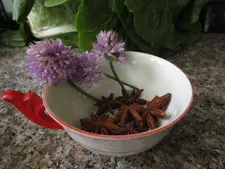 |
| In Last Film Show, star anise is featured. Pan Nalin on his family: “My mother was a great cook and my father believed in always getting everything organic and natural.” Photo: Anne-Katrin Titze |
AKT: And using found objects! A projector out of a sewing machine, coloured glass shards, and I loved the storytelling with matchboxes! Found objects turning into stories - that’s really what life is.
PN: Yeah!
AKT: You say you were re-finding your own life experiences in cinema, in the greats who have had somehow a similar experience. It binds us. But I want to get to another aspect of your film that totally fascinated me, and that is the cooking! The recipes and the way you film them, is that autobiographical as well?
PN: Yes!
AKT: These are your mother’s recipes?
PN: Yes, they’re all my mother’s recipes and they are also local recipes you find in that region. They are all historically vegetarian, and even today.
AKT: Oh wonderful! That was my next question, I love it, I’m so happy.
PN: Yes it is! I don’t know if you know, of the entire globe’s population only 3% of the people are vegetarian, or 3.5%. 2.5% of that 3% live in that area. You can imagine how big vegetarianism has been there for ages. That’s why most of this food is not exportable. You don’t get it outside, forget abroad, not even in India outside that region. You won’t find it in Mumbai or Delhi. My mother was a great cook and my father believed in always getting everything organic and natural. Everything was organic anyway without knowing what organic should be.
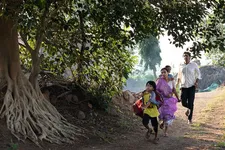 |
| Samay (Bhavin Rabari) with his mother Baa (Richa Meena), father Bapuji (Dipen Raval), and sister Sili (Vidita Mehta) |
The only discussion in our house was food. What is for breakfast, lunch, and dinner? Where do we get spices? Chili crop must have grown, let’s buy chili! Sugar cane crop is just over! Oh, mustard seeds are up! There was no other discussion in the house! My father was a great cook, my brother is a great cook. It had a great impact. Those days when I was truly swapping my school lunch with the projector operator to watch movies, I didn’t know I was doing anything exceptional. But he made me realize how great my mother’s cooking is. As a kid I didn’t know it was something great. He said “You don’t know, my wife makes horrible food, my god, this is divine!”
AKT: What’s your mother’s name? I want to give her credit!
PN: Oh wonderful! Hanasa.
AKT: I loved everything about it! Actually, this morning I had a decision to make. I have a farmers market right up my street today and I had to decide if I go before or after speaking with you. Now I’m going to try to make something with coriander and lentils and star anise.
PN: Oh wow, yes! You know, my mother didn’t know how to read or write but she had that wisdom of living her life and she would often end up relating everything to food. We had to pray, Hindu family, and I used to say I don’t believe in God as a kid. And there’d be arguments. So over dinner there is this argument if God exists or not, with my sister and father. And my mother will not speak a word. When we finish eating, while collecting the plates, when there’s a silence, she will say “Okay kids, do you believe in cook, or not?” Somebody made this food, you know!
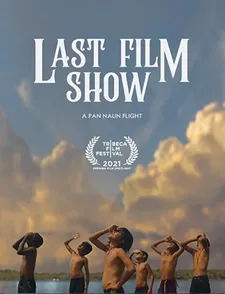 |
| Last Film Show is a highlight of the 20th anniversary Tribeca Film Festival |
AKT: Did you ever think about putting together a cookbook?
PN: Oh, with my brother we’re really thinking about a cookbook or video blog, because while we were making the film, the whole crew started eating that food. We used to make three, four dishes to shoot multiple takes. Especially our Director of Photography [Sonawane], when I come on the set there are only two plates left. I said “I can only do two takes! They said the DoP and the sound designer [Gilles Benardeau] ate it. I said “Guys, I promise you, I will get the shot in one take!” So we thought we should definitely do something about this. In this region, because most of the people are vegetarian, the non-vegetarians used to insult us by calling us “bad hunters!” So we were known as bad hunters.
AKT: I love it. You don’t make it explicit, but every ingredient I saw made it vegetarian. The little star anise we see even connects to the Galaxy Cinema.
PN: Yes!
AKT: When I spoke with Frédéric Boyer, Tribeca’s Artistic Director, he told me that yours was the film to see. He highly recommended it.
PN: How nice! Thank you!
AKT: Thank you for a great film and for taking the time to talk!
PN: Thank you for having me! See you in Tribeca! I hope it all goes well. Bye-bye, thank you so much!
Coming up - Frank Sinatra and Tom Jobim, Pan Nalin on watching lions, the ghost village, an ideal boy, the tragedy of the destruction of film prints, and movies and directors’ colour palates.
Pan Nalin will introduce the FREE W/TICKET Pier 76 in Hudson River Park Last Film Show screening on Thursday, June 10 at 8:00pm and will participate in a Q&A. The film will be available to stream on demand starting at 6:00pm on Friday, June 11 through Wednesday, June 23.
This year's Tribeca Film Festival has moved from its regular spring dates in response to the pandemic and will run from June 9 to 20. There will be in-person and drive-in events and, for the first time, the festival will have venues across the city's five boroughs.








![Samay (Bhavin Rabari) gives his food to projectionist Fazal (Bhavesh Shrimali) in Pan Nalin’s Last Film Show: “Yes, they’re all my mother’s [Hanasa] recipes and they are also local recipes you find in that region. They are all historically vegetarian, and even today.”](/images/newsite/Bhavin_Rabari_Bhavesh_Shrimali_1_600.webp)













